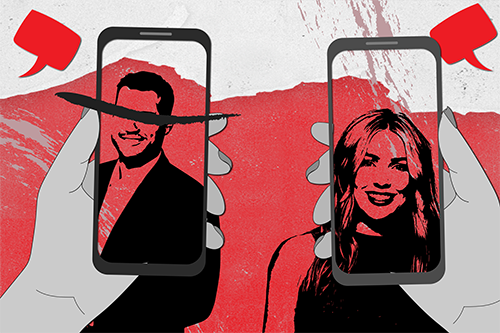Does the entertainment industry make light of serious relationship issues?

Trigger Warning: this article has a heavy focus on stalking. A list of resources for help is provided at the end for anyone who may be interested.
Singer Brighton Reinhardt released the single “Creep” on January 8 with m0mmasboy, about a man who stalks his ex-girlfriend.
Reinhardt is rumored to be dating Cassie Randolph, the winner of season 23 of ABC’s “The Bachelor.” Post-show Randolph dated that season’s leading man, Colton Underwood, for two years.
In May 2020 Randolph and Underwood shocked fans by announcing their breakup via Instagram. The fans’ surprise persisted the following September when TMZ uncovered court documents proving that Randolph filed for a temporary restraining order against Underwood.
In those documents, according to TMZ, Randolph claimed that Underwood sent her anonymous text messages accusing her of hanging out with her ex-boyfriend, sent himself messages from the anonymous number to prove to her that he was getting the same texts, planted a tracking device on her car, showed up unannounced to her apartment and her parents’ home, and loitered outside of her apartment complex and in the alley outside of her bedroom window.
With Reinhardt’s rumored connection to Randolph, the “Creep” lyrics – “GPS on the underside” and “I’m not with all the creepiness the cameras bring”– led fans to speculate that the song is about Underwood.
So, if the song is about Underwood, that raises the pressing question of if “Creep” makes light of a potentially dangerous situation?
“You can’t stop thinking about my baby/ What once was yours in the world is changing… then stop looking behind cuz you’re a creep,” sings Reinhardt.
These lyrics feel like Reinhardt is being playful and taunting to Underwood and the entire melody of the song itself is upbeat and poppish.
By reinforcing the idea that he is dating Underwood’s ex-girlfriend, Reinhardt is inherently showing the former bachelor that he “won” what the reality star lost. Reinhardt made the entire situation feel like a joke by making fun of Underwood.
This is not the first time the unbalanced power dynamic in Randolph and Underwood’s relationship was not taken seriously by the media. In the season 23 finale of “The Bachelor,” Underwood hopped a fence to ask Randolph to pursue a relationship with him when she attempted to leave the show.
Randolph did agree to date Underwood. However, she could have easily felt forced to considering the pressure of being on camera and running the risk of gaining negative media attention rather than out of a genuine desire to keep dating the former bachelor.
ABC and fans on social media raved about how romantic Underwood hopping the fence and convincing Randolph to leave the show with him was. Although this can be seen as a “grand romantic gesture” and a genuine declaration of love, the act also could’ve potentially set up the unequal power dynamics in their relationship.
Since Randolph wanted to leave the “The Bachelor,” and in turn, end her relationship with Underwood, when Underwood would not take no for an answer, he established that he had primary control in their relationship. With this control, Randolph’s role would be to inevitably fall subservient to Underwood
The claims in the restraining order proved that Randolph and Underwood’s relationship was not the romantic fairytale that ABC edited it to be.
Their relationship could have potentially been a situation where Underwood became addicted to controlling Randolph’s actions and behaviors. He became so comfortable in this dynamic, that his greatest fear of losing her and the power he had over her was solidified when the two stars publicly announced their split.
Underwood’s season of “The Bachelor” was hardly the first time that an imbalance of power in relationships was exhibited in the media. Fairy tales such as “Beauty and the Beast” and “Cinderella,” have been teaching generations of young girls that men are supposed to chase and relentlessly pursue women.
This idea establishes in women from a young age that they do not have the power to pick their own partners. This feeds into the stereotypical relationship gender roles that men have the power to control their significant others, while women are supposed to serve and keep their partners happy. Since the media romanticizes an unbalanced power dynamic, it is not surprising that millions of women eventually rooted for Randolph and Underwood’s “real-life fairytale.”
In the case of ABC, the network executives need to realize that the idea of a fairytale is outdated. Producers in the media need to see the consequences of the way serious messages are portrayed.
In the case of Reinhardt singing about stalking jokingly and almost joyfully, allows stalkers to be led to believe that their actions will be taken lightly and that there are no consequences for their actions.
In 2021, romance is about having a relationship where each partner has the exact same amount of power. If audiences want media that portray serious actions having serious consequences, they need to speak out about the problem and potentially boycott media that is currently promoting unhealthy tendencies.
Views and streams, like in the case of “Creep,” translate to money. At the end of the day, the best way to force media producers to change and stop romanticizing unhealthy relationship dynamics is to not give them the satisfaction of your viewership.
If you or anyone you know has been affected by stalking here is a short list of resources that can help you:
Cal Poly Safer Cal Poly Counseling Services
[email protected] 805-756-2511
805-756-2282
Stand Strong (SLO Domestic Violence Services)
805-781-6400

